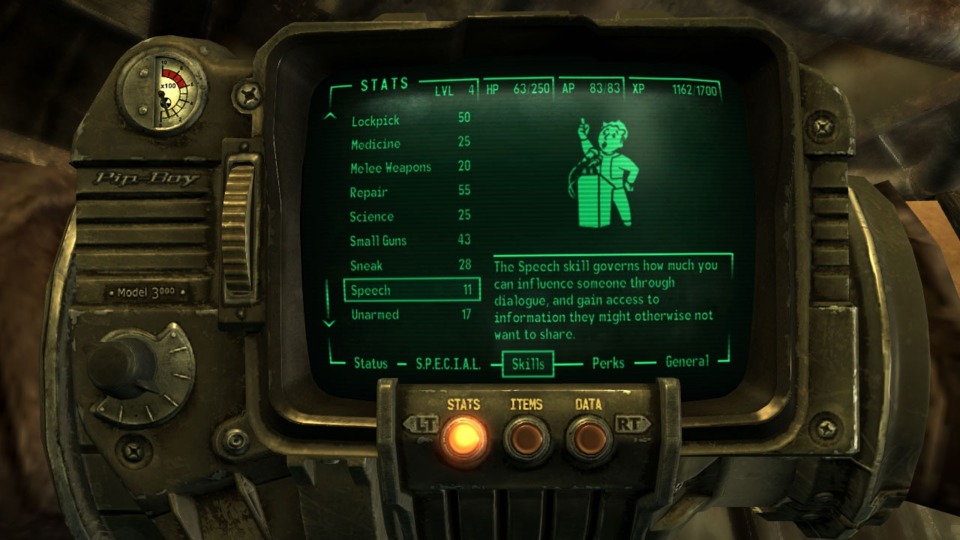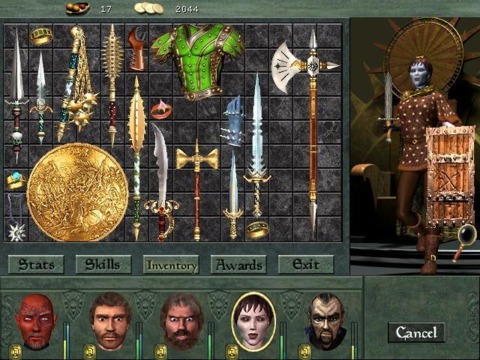Overview
Game developers approach inventories in a variety of ways. There are several main types of inventory.
Types of Inventory
Limited Inventories
In many games a player is only allowed to carry a set number of items, this means that a player must prioritize certain items over others in order to manage the amount of space available. This prevents the player often from being a "jack of all trades" forcing them to stick to one style of play. The limits of an inventory can be based on the number of items, the size of the items, or the weight of the items. A prime example is the Call of Duty series which only allows someone to carry 2 different weapons and grenades. These inventories can be supplemented by the use of some sort of bank, allowing the player to store what items are not needed until they can be used later on.
Unlimited inventories
Fairly self explanatory, these are used to prevent the player from worrying about what he or she must carry. These types of inventories often result in the player suffering from an overabundance of items that can make finding what you need a hassle, and can make a player overpowered if they are able to simply stockpile whatever they find for later use.
Inventory management is key to a players gaming experience, many games have failed in large part due to their lack of an effective inventory system. Two primary forms of inventory management are......
"Utility Belt" inventories
These are inventories that can be accessed on the fly by a simple button press, switching between items is seamless and does not get in the way of the action. Half Life's inventory system works like this. A player need only press a button to switch to their other items. Size and weight are usually not the limiting factor in these systems, although some games will incur negative or positive bonuses on a player depending on what items are in their "utility belt", for example, Call of Duty slows down the movement of players with heavy machine guns.
Menu based inventories.
 The Pip Boy, a weight based inventory.
The Pip Boy, a weight based inventory.Perhaps the most common form of inventory, often found in genres such as MMOs, RPGs, and RTS's. These require the player to pull up a separate menu that contains all of their items. Items selection is also done through this menu. This prevents fast switching of items but provides a easy to use overview of all the player's items. In the games of the Fallout series, items are equipped by selecting them in the player's Pip Boy, which acts as a in-context menu system.
Many games provide ways of organizing your inventory through the use of customizable tabs that items can be grouped into. This lessens the hassles of inventory management that games where items are simply listed suffer from. One of the original Mass Effect's biggest flaws was its cumbersome list based item menu. After a mission the player would have to scroll through a huge list of items just to find what they wanted to use or get rid of. It was so badly accepted that it underwent a total revamp on the later PC release.
 A size based inventory.
A size based inventory.Many games base the available space in their inventory menu on factors such as size and weight. In some games, certain items take up more area in the player's item list than others. In some games, smaller items such as arrows or bullets, will "stack" meaning that an unlimited amount of those items can be stored in that one slot of the player's inventory, other games allow items to stack but still count them towards the total item amount.. Weight based
systems prevent the player from carrying too much of certain items, in Fallout 3 weapons that are more powerful such as rocket launchers weighed far more than weaker weapons such as pistols. If the player carried a heavier amount of items than was allowed, the player's movement was lowered to a very slow crawl.
Log in to comment